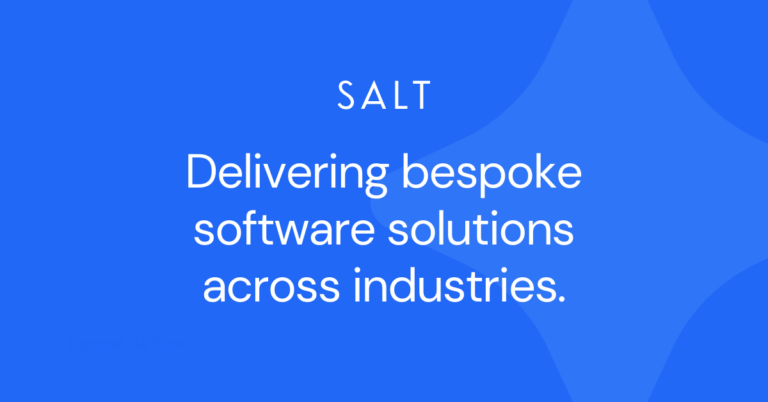In an age where online presence is not just beneficial but essential, the role of Search Engine Optimization (SEO) cannot be overstated. SEO is the secret sauce that propels your website to the forefront of search engine results, increasing visibility and driving organic traffic your way.
Whether you’re a small business, a bustling e-commerce store, or a popular blog, having a robust SEO strategy can make all the difference between getting noticed or getting lost in the crowd.
Enter WordPress – a tool that is not just a popular content management system but also an effective ally in your SEO efforts. Powering over 40% of all websites as of 2023, WordPress has carved a niche for itself with its user-friendly interface, flexible design options, and a rich repository of SEO tools. But the question remains – how do you use WordPress to its full potential and maximize SEO for WordPress site?
At Salt Technologies, we’re here to help you answer that question. With our extensive experience in providing top-notch WordPress Development Services, we’ve acquired a deep understanding of the WordPress ecosystem and its SEO capabilities. Join us as we delve into the world of WordPress SEO and provide you with the essential guide to maximize your site’s SEO potential.
This blog will explore the basics, highlight the importance of high-quality content, uncover advanced SEO practices, and much more. So whether you’re new to WordPress SEO or looking to refine your existing strategy, there’s something here for you. Let’s get started!
Basics of WordPress SEO
SEO is a vast field with many factors influencing your site’s ranking on search engines like Google, Bing, and Yahoo. With WordPress, you have a strong foundation for building an SEO-friendly website. In this section, we’ll explore some basic principles and features of WordPress that help maximize your SEO efforts.
A. SEO-Friendly Themes and Plugins
WordPress is renowned for its extensive collection of themes and plugins, many of which are designed with SEO in mind. When choosing a theme, it’s crucial to pick one that is not just visually appealing but also optimized for search engines.
- Clean Code: Themes with clean and lightweight code are often more SEO-friendly, as search engines can easily crawl and index your site.
- Responsive Design: With Google’s mobile-first indexing, having a responsive design that adapts seamlessly to different devices is a must for SEO.
- Speed: Fast-loading themes contribute to a better user experience and are favored by search engines.
Plugins further enhance your WordPress site’s SEO capabilities. While we’ll delve into specific SEO plugins in a later section, it’s worth noting that there are plugins to optimize everything from meta tags and sitemaps to images and broken links.
B. Permalink Structure
Permalinks are the permanent URLs to your individual blog posts, pages, and other content. WordPress allows you to easily customize your permalink structure—a crucial feature for SEO. You want your URLs to be easily readable and contain your main keywords. An SEO-friendly URL might look something like this: www.salttechno.com/wordpress-development.
C. Categories and Tags
WordPress lets you organize your content using categories and tags. Categories provide a broad grouping of your posts, while tags describe specific details of your posts. Proper use of categories and tags not only makes your site easier to navigate for users but also helps search engines understand your content better, contributing to improved SEO.
D. Image Optimization
Images can significantly enhance your site’s appeal but, if not optimized, they can slow down your site—a negative factor for SEO. WordPress makes it easy to optimize your images by allowing you to add alt text, compress images, and use appropriate file formats.
In the next sections, we’ll dive deeper into how you can leverage the power of WordPress for your SEO strategy, starting with effective keyword research and application.
Keyword Research and Application
Keywords play a critical role in SEO, acting as the bridge between what people are searching for and the content you are providing to meet that need. Effective keyword research and application in your WordPress site can drive more traffic, improve rankings, and even boost conversions. Here’s how to go about it.

A. Keyword Research
Keyword research is the process of finding and analyzing search terms that people enter into search engines. It provides insights into what your target audience is looking for, allowing you to create relevant content that meets their needs.
- Identify Relevant Topics: Start by brainstorming topics relevant to your business or industry. Consider the questions your customers frequently ask, problems they’re trying to solve, or popular topics in your industry.
- Find Keyword Opportunities: Use keyword research tools like Google Keyword Planner, SEMRush, or Ahrefs to find keywords related to your topics. Look for keywords with a good search volume (indicating demand) and low competition (suggesting opportunity).
- Long-Tail Keywords: Don’t overlook long-tail keywords—longer, more specific phrases with lower search volume but typically lower competition and higher conversion rates.
B. Keyword Application in WordPress
Once you have a list of keywords, it’s time to apply them in your WordPress site. Here’s how to effectively use keywords in your WordPress content.
- Titles: The title of your page or post is a key SEO element. Include your primary keyword in the title, preferably towards the beginning.
- Meta Descriptions: These brief summaries appear in search engine results and can influence whether users click on your site. Include your primary keyword and make the description enticing.
- URLs: As mentioned before, WordPress allows you to customize your URLs. Include your primary keyword in the URL for SEO benefits.
- Content: Use your keywords naturally in your content. Avoid keyword stuffing, as it can hurt your SEO. Instead, focus on creating useful, high-quality content that incorporates your keywords where relevant.
In the next section, we’ll discuss why high-quality content is crucial for SEO and provide tips on creating engaging, SEO-optimized content on your WordPress site.
Importance of High-Quality Content
“You can’t just ‘SEO’ your way to the top,” says Spencer Haws, creator of Link Whisper and Niche Pursuits. If SEO is a vehicle driving your website’s visibility, high-quality content is the fuel. It plays a pivotal role in attracting and retaining users, thereby sending positive signals to search engines about your website’s value. Let’s look at how you can create engaging, SEO-optimized content on your WordPress site.
A. Content That Serves a Purpose
First and foremost, your content should serve a purpose. It should meet a need, solve a problem, answer a question, or provide valuable information. Understanding your audience is key to creating purposeful content. Use your keyword research to find out what your audience is searching for and then create content to meet those needs.
B. Unique and Original
With countless websites vying for attention, unique and original content can set your site apart. Duplicating content can harm your SEO, while original content can increase your site’s relevance and authority in the eyes of search engines.
C. Readability and Structure
Long paragraphs can make your content difficult to read. Break up your content into smaller sections with clear headings and subheadings. Lists and bullet points can also improve readability. WordPress’s built-in editor, Gutenberg, provides a variety of blocks to structure your content effectively.
D. Use of Multimedia
Engaging content often goes beyond text. Images, videos, infographics, and other forms of multimedia can make your content more engaging and shareable. They also keep users on your site longer—a positive factor for SEO. Remember to optimize your multimedia with relevant file names, alt text, and compression for fast loading.
E. Regular Updates
Content freshness can influence your site’s ranking. Regularly updating your content can signal to search engines that your site is current and relevant. WordPress makes it easy to update your content, and you can even display the last updated date on your posts.
In the next section, we will explore how WordPress plugins can be a game-changer in your SEO strategy.
Leveraging WordPress Plugins for SEO
One of the key strengths of WordPress is its flexibility, which is largely due to its expansive library of plugins. With the right plugins, you can extend the functionality of your website in many ways, including improving your SEO. Here, we introduce a few popular SEO plugins and explain how they can enhance your SEO efforts.
A. Yoast SEO
Arguably the most popular SEO plugin for WordPress, Yoast SEO provides a comprehensive suite of tools to optimize your website. With Yoast, you can:
- Optimize Metadata: Easily customize your titles and meta descriptions.
- Manage XML Sitemaps: Automatically generate and update XML sitemaps for search engines.
- Control Indexing: Set indexing rules to guide search engines in crawling your site.
B. Rank Math
Rank Math is another powerful SEO plugin that provides some unique features. With Rank Math, you can:
- Optimize for Rich Snippets: Improve your site’s visibility in search results with schema markup.
- Integrate with Google Search Console: Monitor your site’s performance directly from your WordPress dashboard.
- Manage 404 Errors: Easily redirect broken URLs to improve user experience and SEO.
C. All in One SEO (AIOSEO)
All in One SEO is a user-friendly SEO plugin that comes with powerful features to boost your website’s SEO. With AIOSEO, you can:
- Improve Local SEO: Enhance your visibility in local search results.
- Integrate with Social Media: Optimize your content for sharing on social media with Open Graph metadata.
- Advanced Robots Meta SEO Settings: Control how your pages appear in search results and what gets indexed.
Remember, using SEO plugins effectively requires more than just installing and activating them. It involves understanding their features, configuring them correctly, and updating them regularly for the best results.
In our next section, we’ll explore more advanced SEO practices and how WordPress can support these techniques.
Advanced SEO for WordPress Site
While mastering the basics of SEO is crucial, incorporating advanced SEO practices into your strategy can give you an extra edge. WordPress, with its versatile ecosystem, supports several advanced SEO techniques. Let’s explore a few of these.
A. Schema Markup
Schema markup, or structured data, helps search engines better understand your content. This can lead to rich results, which are more visually appealing and informative search results. Various WordPress plugins, like Schema Pro or Rank Math, can help you add schema markup to your WordPress site.
B. XML Sitemaps and Robots.txt Files
An XML sitemap provides search engines with a roadmap of your site, making it easier for them to discover and index your content. Many SEO plugins, like Yoast SEO, can generate an XML sitemap for you.
A robots.txt file guides search engine bots about which parts of your site to crawl or ignore. This is particularly useful for large websites or sites with specific areas that don’t need to be indexed.
C. HTTPS Implementation
HTTPS (Hypertext Transfer Protocol Secure) is an internet communication protocol that protects the integrity and confidentiality of your users’ data. Apart from the security benefits, HTTPS is also a ranking factor for Google. WordPress supports HTTPS, and many hosting providers offer free SSL certificates that you can install on your site.
D. Structured Data and Open Graph Protocol
Structured data and Open Graph protocol can enhance how your pages appear in search results and when shared on social media platforms. Many WordPress plugins provide easy options to add structured data and Open Graph tags to your site.
E. Voice Search Optimization
With the rise of digital assistants like Alexa, Siri, and Google Assistant, optimizing for voice search is becoming increasingly important. Voice searches are often longer and more conversational than text searches. WordPress plugins like Schema Pro can help you add FAQ schema to your pages, a great way to optimize for voice search.
As part of our WordPress Development Services at Salt Technologies, we leverage these advanced practices to optimize your WordPress site for maximum visibility. We’ll dive more into local SEO and its importance in our next section.
Local SEO and WordPress
Local SEO is a strategic process that focuses on emphasizing optimization efforts for local brick-and-mortar businesses. If you’re running a business that serves customers at a particular location, or within a designated service area, Local SEO should be a fundamental part of your strategy. Let’s explore how WordPress can help enhance your local SEO.
A. Google My Business and Bing Places
Google My Business and Bing Places are essential tools for local SEO. They allow you to create a business listing that appears in local search results and on maps. You can integrate these tools with your WordPress site by using plugins like WP Google Maps and Local SEO & Business Listings.
B. NAP Consistency
NAP stands for Name, Address, and Phone number. It’s crucial that your NAP information is consistent across the web, as inconsistencies can hurt your local SEO. WordPress makes it easy to manage and update your NAP information across your site.
C. Local Schema Markup
Adding local schema markup to your site can help search engines understand more about your business, like its type, location, and operating hours. Plugins like All In One Schema.org Rich Snippets can help you add local schema markup to your WordPress site.
D. Online Reviews
Online reviews can influence your local SEO and your business’s reputation. Encourage your customers to leave reviews, respond to them promptly, and showcase positive reviews on your site. There are several WordPress plugins, like WP Business Reviews, that can help manage and display reviews on your site.
E. Localized Content
Creating content that’s relevant to your local area can boost your local SEO. This could include blog posts about local events or news, a page dedicated to local services, or even testimonials from local customers.
At Salt Technologies, we understand the importance of local SEO in driving traffic and conversions. As part of our WordPress Development Services, we take a comprehensive approach to optimize your site for local search.
In the next section, we’ll talk about the significance of mobile optimization in SEO and how WordPress facilitates this.
Mobile Optimization in WordPress
With more than half of all web traffic coming from mobile devices, mobile optimization is no longer optional—it’s essential. Mobile optimization involves ensuring your website looks and performs well on mobile devices. Search engines like Google prioritize mobile-friendly websites in search results, so mobile optimization can directly impact your SEO. Let’s explore how WordPress can help make your site mobile-friendly.
A. Responsive Themes
WordPress offers numerous responsive themes that automatically adjust the layout of your website to fit the screen size of the device being used. Whether your visitors are using a desktop, tablet, or smartphone, your WordPress site will look great.
B. Mobile-Optimized Plugins
Many WordPress plugins are designed with mobile optimization in mind. For instance, WPtouch automatically creates a simple, elegant mobile version of your site. AMP for WP – Accelerated Mobile Pages automatically adds Accelerated Mobile Pages functionality to your site, making it faster for mobile users.
C. Speed Optimization
A slow-loading website can be especially frustrating on mobile devices. WordPress offers many speed optimization plugins, like WP Rocket and Smush, that can help improve your site’s loading speed.
D. Mobile SEO
Optimizing for mobile SEO involves practices like ensuring your site is crawlable, keeping an easy-to-use design, and improving loading times. Plugins like Yoast SEO have specific features for mobile SEO.
E. Mobile Usability Testing
Testing your site’s mobile usability regularly is critical. Google’s Mobile-Friendly Test tool can help you assess your site’s mobile usability. WordPress’s preview feature also lets you see how your site will look on different devices.
At Salt Technologies, we know the importance of mobile optimization and its impact on SEO. Our WordPress Development Services ensure your website provides an excellent user experience across all devices.
In our final section, we’ll wrap up our guide to WordPress SEO, summarizing what we’ve covered.
Ongoing SEO Analysis and Maintenance
SEO isn’t a one-time task but an ongoing process. The digital landscape is constantly evolving, as are search engine algorithms. To keep up with these changes and ensure your SEO efforts continue to yield results, you must commit to regular SEO analysis and maintenance. Here’s how WordPress can support these ongoing SEO efforts.
A. Regular Audits
Regular SEO audits can help identify strengths, weaknesses, and opportunities for your website. WordPress plugins like SEOPressor provide comprehensive SEO analysis tools to facilitate these audits.
B. Performance Tracking
Tracking the performance of your SEO efforts can help you understand what’s working and what needs improvement. WordPress plugins like MonsterInsights connect your site to Google Analytics, providing valuable insights about your site’s traffic, user behavior, and more.
C. Staying Updated
Staying up-to-date with the latest SEO trends and algorithm updates can help you refine your strategy over time. Many WordPress SEO plugins regularly update their features in response to these changes.
D. User Experience Monitoring
User experience is a key factor in SEO. Monitoring how users interact with your site and making necessary improvements can enhance user experience and SEO. Tools like Hotjar can be integrated with WordPress to provide heatmaps, user recordings, and other user experience insights.
E. Regular Updates and Backups
Regularly updating and backing up your WordPress site can protect it from security threats, which can harm your SEO. WordPress’s built-in update and backup features make this easy.
At Salt Technologies, we offer WordPress Development Services that go beyond just creating a website. We ensure your WordPress site is built with SEO in mind and equip you with the tools and strategies for ongoing SEO success.
In the final section, we will conclude our discussion on SEO for WordPress site.
Conclusion and Next Steps
SEO is a vital part of any website’s success, and WordPress offers a powerful, flexible platform to optimize your site for search engines. From user-friendly design options to a vast selection of SEO-focused plugins, WordPress empowers you to take control of your site’s SEO.
Throughout this blog post, we’ve explored how WordPress supports SEO, from the basics of keyword optimization and creating high-quality content, to advanced practices like local SEO and mobile optimization. However, remember that SEO is not a set-and-forget task. Ongoing analysis and maintenance are critical to ensuring that your SEO efforts continue to deliver results.
For businesses seeking professional help with their WordPress site’s SEO, Salt Technologies is here for you. We specialize in WordPress Development Services, crafting SEO-friendly websites that not only look great but perform well in search engine rankings. We believe that a well-designed website is a powerful tool in your digital marketing arsenal, and we’re committed to helping you make the most of it.
Thank you for joining us in this exploration of WordPress and SEO. Remember, the SEO journey is a marathon, not a sprint, and every step you take toward optimizing your site brings you closer to your goals.
We look forward to hearing your thoughts on this blog post and are eager to help with any questions or requirements you may have regarding WordPress Development and SEO. Reach out to us today!


